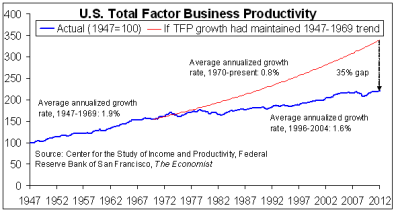Productivity in the Collaborative Age is a major mystery. Apparently, from the economists perspective, it would seem that the productivity improvement rate has dramatically dropped in developed countries since the 1970s. On the other hand, we definitely manage to do more in a day than before, in great part thanks to the support provided by our GPS, the communication capability of our phones and all sorts of productivity tools we have been given.
 From my perspective, there would then be two explanations to this apparent contradiction: either the measurement of value created is flawed, or while some of us have dramatically increased their productivity, others have dramatically lowered their’s.
From my perspective, there would then be two explanations to this apparent contradiction: either the measurement of value created is flawed, or while some of us have dramatically increased their productivity, others have dramatically lowered their’s.
I tend to believe that there is something wrong with the measurement of value created, because I observe that a lot of the services offered by modern technology serve to diminish the cost of services while improving the service itself (which has value), or even create services that have no value thanks to connections created. Of course, we should not dismiss the hypothesis that social networks have also diminished the productivity of part of the population, however this has to be compared to watching TV which also involved a lot of time previously (but was less pervasive in every location of our daily life).
However, this productivity issue still shows that income tends to diminish for the amount of work performed, since productivity is also linked to the value created.
This goes back to the issue of GDP as good measurement of economic health. Those measurements of the Industrial Age will have to be revamped soon because they are becoming increasingly obsolete.
